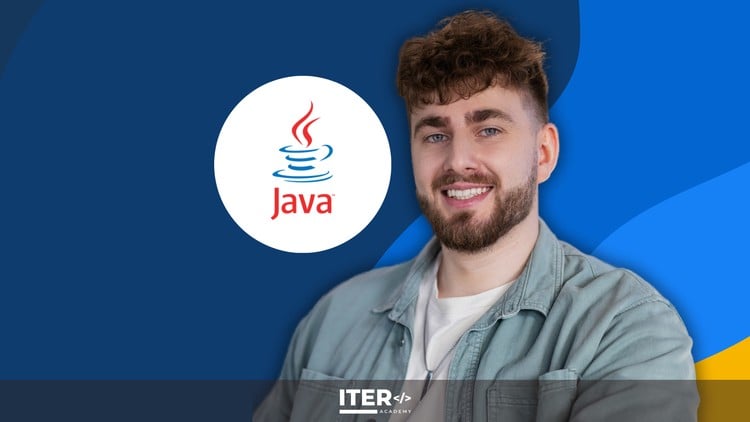
Java, Java Core, Object Oriented Programming (OOP), Collections, Maps, Exceptions, Generics, IO, Concurrency Explained
⏱️ Length: 16.7 total hours
⭐ 4.40/5 rating
👥 22,187 students
🔄 May 2025 update
Add-On Information:
Note➛ Make sure your 𝐔𝐝𝐞𝐦𝐲 cart has only this course you're going to enroll it now, Remove all other courses from the 𝐔𝐝𝐞𝐦𝐲 cart before Enrolling!
-
Course Overview
- Embark on a comprehensive and up-to-date journey into the world of Java programming with the ‘Java: Complete Java Core for Beginners with Exercises – 2025’ course. Designed specifically for absolute novices, this program provides a robust foundation in Java, equipping you with the essential skills to write efficient, clean, and object-oriented code.
- Spanning 16.7 hours, this course meticulously covers core Java concepts, transitioning from foundational syntax to advanced topics crucial for modern development. You will learn not just the “how,” but also the “why” behind Java’s design principles.
- The curriculum is structured to foster practical application through numerous hands-on exercises, ensuring you solidify your understanding and build confidence in your coding abilities. Leverage the latest May 2025 updates to learn the most relevant practices and features.
- With a strong emphasis on Object-Oriented Programming (OOP) principles, this course will empower you to think like a Java developer, preparing you for more complex frameworks and real-world projects in the future.
-
Requirements / Prerequisites
- No prior programming experience is necessary. This course starts from the very beginning, assuming you have no background in coding.
- A desktop or laptop computer capable of running modern software, along with a stable internet connection.
- Basic computer literacy, including navigating file systems, downloading software, and using web browsers.
- An eagerness to learn, experiment, and solve problems through coding.
- Dedication to consistently practice the concepts taught through the provided exercises.
-
Skills Covered / Tools Used
- Mastering Control Flow: Gain proficiency in structuring program logic using conditional statements (
if-else,switch) and various looping constructs (for,while,do-while). - Deep Dive into Object-Oriented Programming (OOP): Understand and apply core OOP pillars including Encapsulation (data hiding and access control), Inheritance (code reuse and hierarchy), Polymorphism (method overriding and overloading), and Abstraction (interfaces and abstract classes).
- Advanced Class and Object Management: Explore constructors, the
thiskeyword,staticmembers, method signatures, return types, and access modifiers to create robust and well-designed classes. - Effective String Manipulation: Beyond basic declaration, learn to utilize various methods of the
Stringclass, understandStringimmutability, and employStringBuilderandStringBufferfor mutable string operations. - Comprehensive Exception Handling: Implement structured error management using
try-catch-finallyblocks, understand exception hierarchies, and create custom exception types for robust application development. - Utilizing the Collections Framework: Work with fundamental data structures like Lists (
ArrayList,LinkedList), Sets (HashSet,TreeSet), and Queues, along with understanding iterators for efficient data traversal. - Working with Maps: Understand key-value pair storage using different Map implementations such as
HashMapandTreeMap, and learn when to apply each for optimal performance. - Generics for Type Safety: Implement generic classes, interfaces, and methods to write flexible, reusable, and type-safe code, preventing runtime errors.
- Input/Output (IO) Operations: Master reading from and writing to files and other streams using Java’s robust I/O API, including character and byte streams, readers, and writers.
- Concurrency and Multithreading Fundamentals: Grasp the basics of creating and managing threads, understanding thread lifecycle, and implementing synchronization mechanisms to prevent race conditions and deadlocks in multi-threaded applications.
- Exploring Wrapper Classes and Enums: Learn how to bridge the gap between primitive types and objects using wrapper classes, and effectively define fixed sets of constants with enumerations.
- Leveraging the Date and Time API: Utilize the modern
java.timepackage for efficient and immutable date and time manipulations. - Integrated Development Environment (IDE) Proficiency: Learn to effectively use popular IDEs (e.g., IntelliJ IDEA, Eclipse, VS Code) for writing, compiling, running, and most importantly, debugging Java applications.
- Understanding Java Virtual Machine (JVM): Gain insights into the Java compilation and execution process, and the role of the JVM in platform independence.
- Mastering Control Flow: Gain proficiency in structuring program logic using conditional statements (
-
Benefits / Outcomes
- Develop the capability to write clear, modular, and efficient Java code from scratch, adhering to best practices.
- Gain a profound understanding of Object-Oriented Programming principles, enabling you to design and implement robust software solutions.
- Build a strong logical foundation for tackling more advanced Java frameworks and technologies, such as Spring Boot, Android development, or enterprise applications.
- Acquire practical problem-solving skills through hands-on coding exercises and real-world scenarios.
- Develop the ability to read, understand, and debug existing Java codebases effectively.
- Create a foundational portfolio of Java core applications and projects to showcase your initial programming prowess.
- Be well-prepared for entry-level Java development roles by mastering the fundamental concepts expected in the industry.
- Confidence in using the standard Java API for various tasks, from data manipulation to file operations and concurrent processing.
-
PROS
- Comprehensive Coverage: Delivers a deep and thorough understanding of all essential Java Core topics from beginner to intermediate levels.
- Hands-On Learning: Integrates practical exercises throughout the course, reinforcing theoretical concepts with immediate application.
- Up-to-Date Content: Features a May 2025 update, ensuring relevance with current Java best practices and features.
- Beginner-Friendly: Structured specifically for absolute beginners, requiring no prior programming experience.
- Proven Quality: Highly rated (4.40/5) by over 22,000 students, indicating a successful learning experience for many.
- Structured Learning Path: Follows a logical progression, building knowledge incrementally for effective mastery.
-
CONS
- Time Commitment Required: Success in the course demands consistent practice and dedicated effort to master the extensive content.
Learning Tracks: English,Development,Programming Languages
Found It Free? Share It Fast!